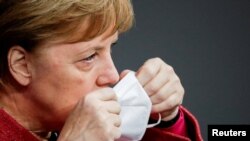German Chancellor Angela Merkel Tuesday called for tougher COVID-19 restrictions as the nation set daily record for deaths from the virus and infection numbers continue to rise.
Speaking in the Bundestag – the lower house of the German parliament - a sometimes-emotional Merkel told lawmakers the nation was in a decisive period of fighting the pandemic, with the second wave far more demanding than the first.
Germany’s Robert Koch Institute for Infectious Diseases reported Wednesday 590 deaths related to COVID-19 in the past 24 hours - more than 100 higher than the week-old previous record – and 20,815 new daily infections, compared with 17,270 a week earlier.
Germany is gradually moving toward a tighter lockdown, at least for a limited period after Christmas, as new coronavirus cases remain high and continue climbing.
This despite a partial shutdown that started in early November, in hopes of allowing a more normal Christmas holiday.
While families will be allowed to gather for Christmas, Merkel is calling for all but the most essential shops to close from Christmas Eve until at least January 10, and for people to work from home and schools to remain closed during that time as well.
The idea is to use the festive period to keep people at home and break the chain of infections. Merkel emphatically urged people to limit their social contacts whenever possible. She said, “If we have too many contacts before Christmas and it ends up being the last Christmas with the grandparents, then we'd really have failed."
Merkel has consistently advocated decisive action but has often had to move more slowly because, in highly decentralized Germany, the country's 16 state governments are responsible for imposing and lifting restrictions.
Germany managed to avoid the high number of infections and grim death tolls seen in other large European nations early in the pandemic and continues to have a much lower overall fatality rate than countries such as Britain, France and Spain.






